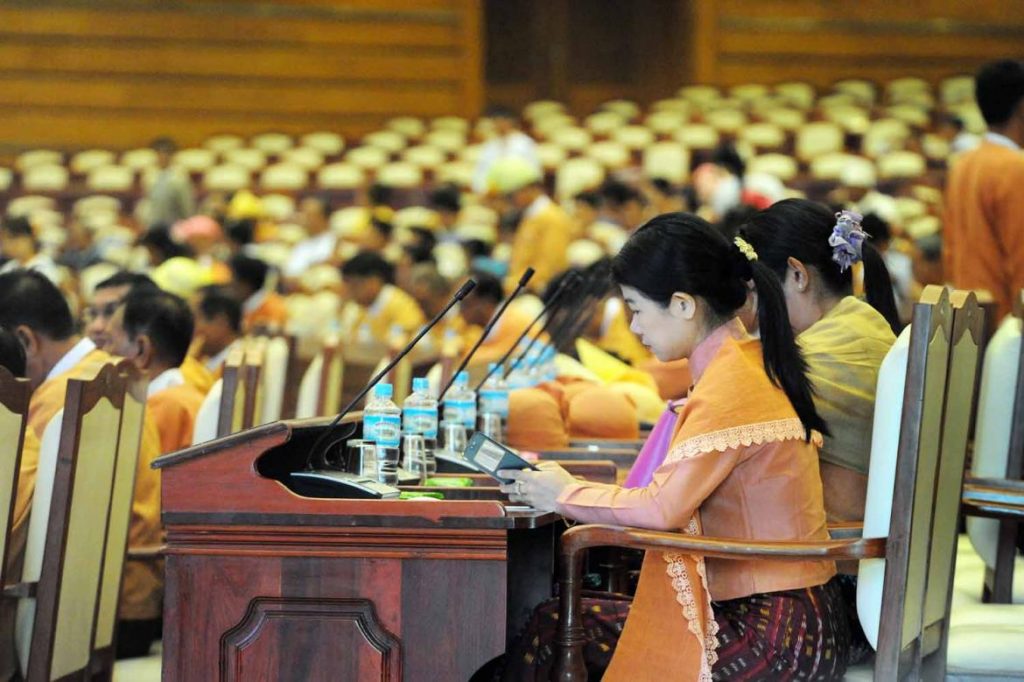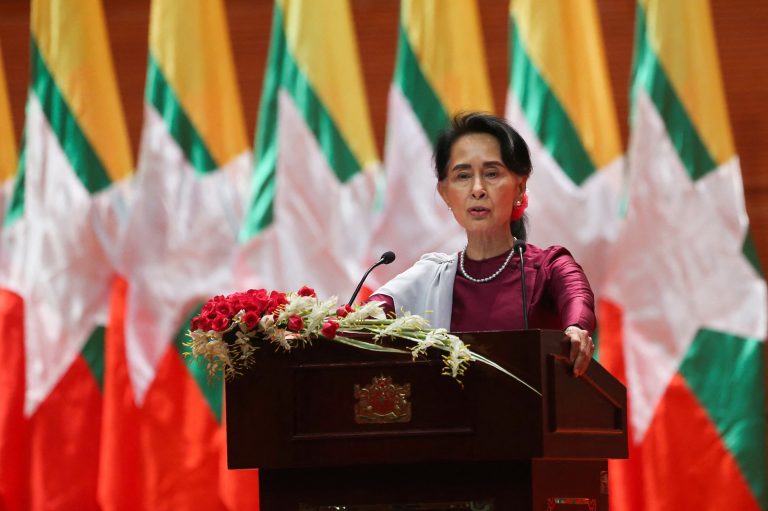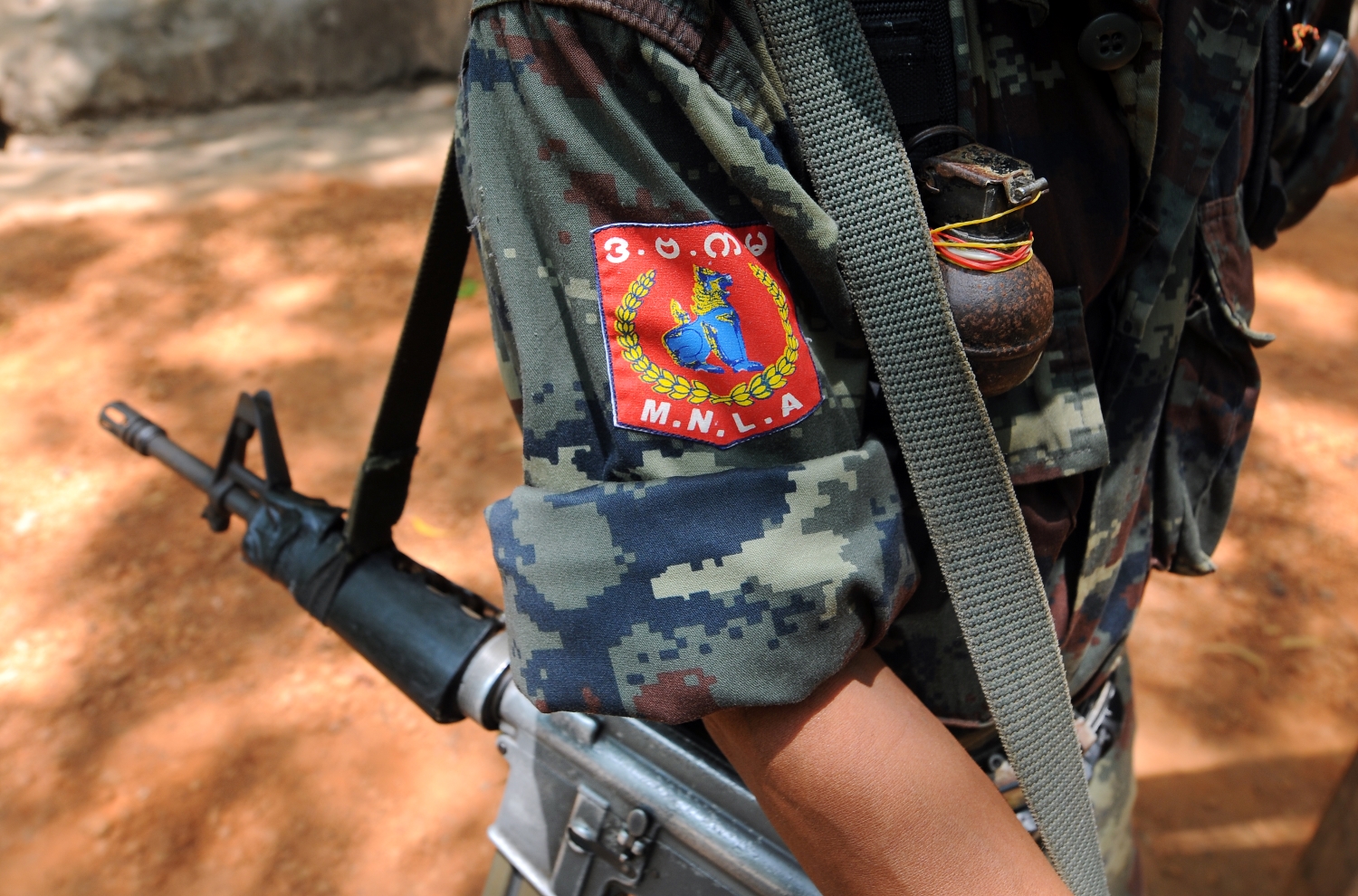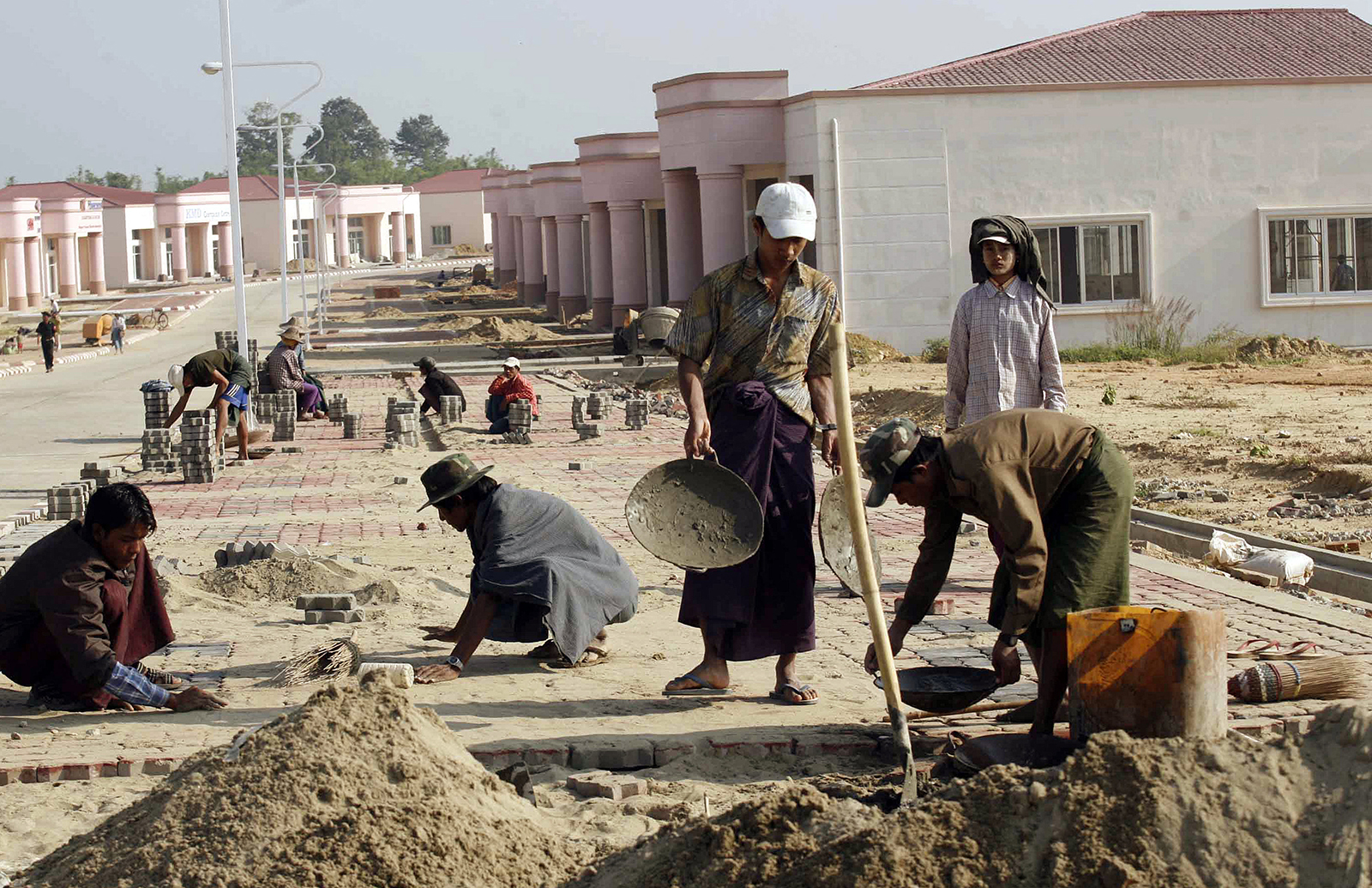Members of the two biggest opposition parties say rulings by the NLD’s Union Parliament speakers are muzzling debate on important national issues.
By NYAN HLAING LYNN | FRONTIER
THE TWO biggest opposition parties in the Union Parliament have sharply criticised the repeated rejection of proposals submitted to the hluttaw, most of which have focussed on security and law and order issues.
Many of the proposals rejected by the National League for Democracy-dominated parliament since the change of government in late March have been tabled by the Arakan National Party.
The ANP is the third biggest party in the Union Parliament, with 22 seats, after the Union Solidarity and Development Party, with 42. The NLD dominates the 664-seat parliament, holding 255 of the 323 seats in which elections were held in November last year for the 330-member Pyithu Hluttaw, and 135 of the 168 elected Amyotha Hluttaw seats. Military appointees hold 110 seats in the lower house and 56 in the upper house.
The speakers of both the Pyithu Hluttaw and the Amyotha Hluttaw are NLD members.
Support more independent journalism like this. Sign up to be a Frontier member.
Of the four proposals on which the ANP has unsuccessfully sought debate, three involved conflict in Rakhine State and the other was in support of student unions. Debate was also blocked on a proposal by a USDP MP aimed at preventing “terrorist” activities in Myanmar.
The Arakan National Party has had a tense relationship with the NLD since the latter appointed a party member to be chief minister in Rakhine in the aftermath of last year’s election, despite the ANP easily winning the most seats in the state assembly.
Pyithu Hluttaw MP U Ba Shein (ANP, Kyaukphyu) told Frontier his party’s policies involved the entire country and not just Rakhine. He expressed disappointment at the rejection last month of his proposal for urgent debate on the security situation in Rakhine in the aftermath of the deadly attacks by militants in Maungdaw Township on October 9.
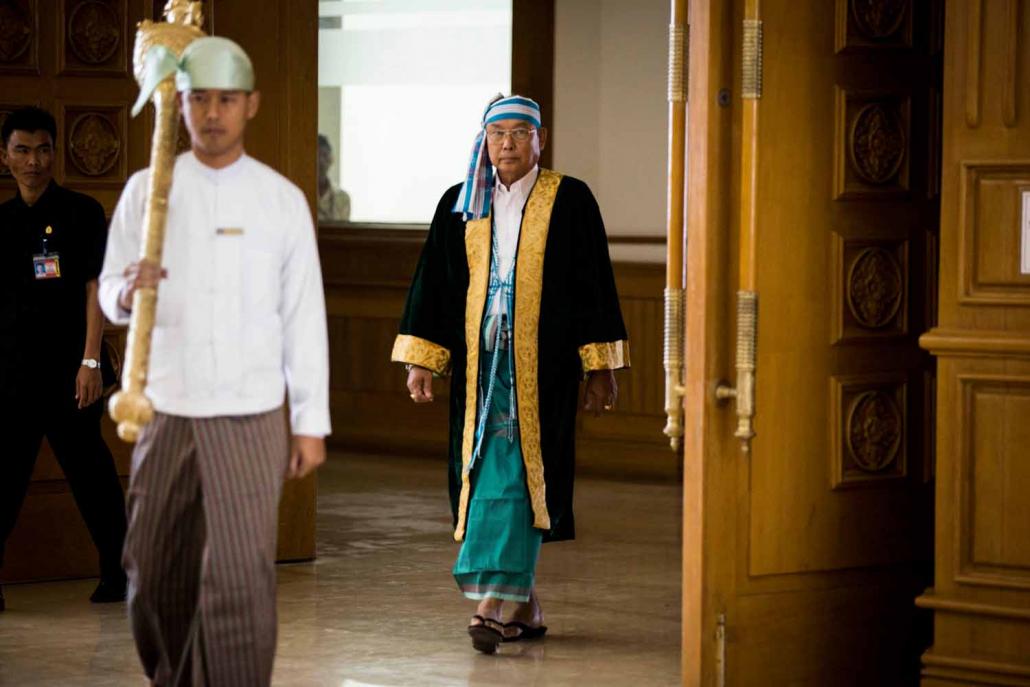
Amyotha Hluttaw Speaker Mahn Win Khaing Than enters a session of the Pyidaungsu Hluttaw on February 8. (Ann Wang / Frontier)
Ba Shein said the proposal had urged the government to eliminate acts of violence in Maungdaw because they posed a threat to national security and sovereignty. He said he submitted the proposal to Pyithu Hluttaw Speaker U Win Myint on November 22, and the next day the director-general of the Pyithu Hluttaw Office told him that he was not authorised to submit it.
It was the second ANP proposal over the situation in Maungdaw to be rejected for discussion. On November 21 in the Amyotha Hluttaw, U Kyaw Kyaw Win (Rakhine-8) tried to table a proposal urging the government to ensure that it was protecting all “national ethnics” in Maungdaw from danger, meeting their basic needs and preventing encroachment by “terrorists”. Amyotha Hluttaw Speaker Mahn Win Khaing Than then instructed him to change the proposal into a question, Kyaw Kyaw Win said.
The MPs said the reason given for rejecting their proposals was because the government had already responded to the situation in Maungdaw. Pyithu Hluttaw lawmaker U Pe Than (ANP, Myebon) said he was “disappointed” at the speaker’s decision, which seemed to be aimed at protecting the government from scrutiny.
“Because it is only a question, the ministry will come and answer in the hluttaw but other MPs will no longer have the chance to discuss the issue,” he said. “I don’t think the speaker of the Amyotha Hluttaw has made the right decision … The speaker must stand for the people. He should show respect for the opinion of MPs. He is not accountable for what the government does, that’s not his responsibility.”
The proposals were all submitted as “urgent”, rather than “ordinary”. This means that they could potentially be considered immediately, rather than put into a queue with other ordinary proposals.
Senior parliamentary officials said urgent proposals need to be submitted directly to the relevant speaker, who then replies to the respective MP.
This is not the first time the speakers have blocked submission of urgent proposals. An attempt by an ANP MP in May to raise concern over fighting in Rakhine between the Tatmadaw and the Arakan Army was also shot down.
Daw Khin Saw Wai (Rathedaung) had tabled a proposal in the Pyithu Hluttaw urging the government to provide assistance to civilians affected by the fighting.
Speaker Win Myint blocked the move, telling reporters that he believed it was a ruse to include the AA – an ethnic armed group that was blocked from signing last year’s Nationwide Ceasefire Agreement – in peace talks.
He said the proposal was thus in breach of standing orders, which proscribe debate in the hluttaws that does not uphold the three main national causes: non-disintegration of the Union, non-disintegration of national solidarity and perpetuation of sovereignty.
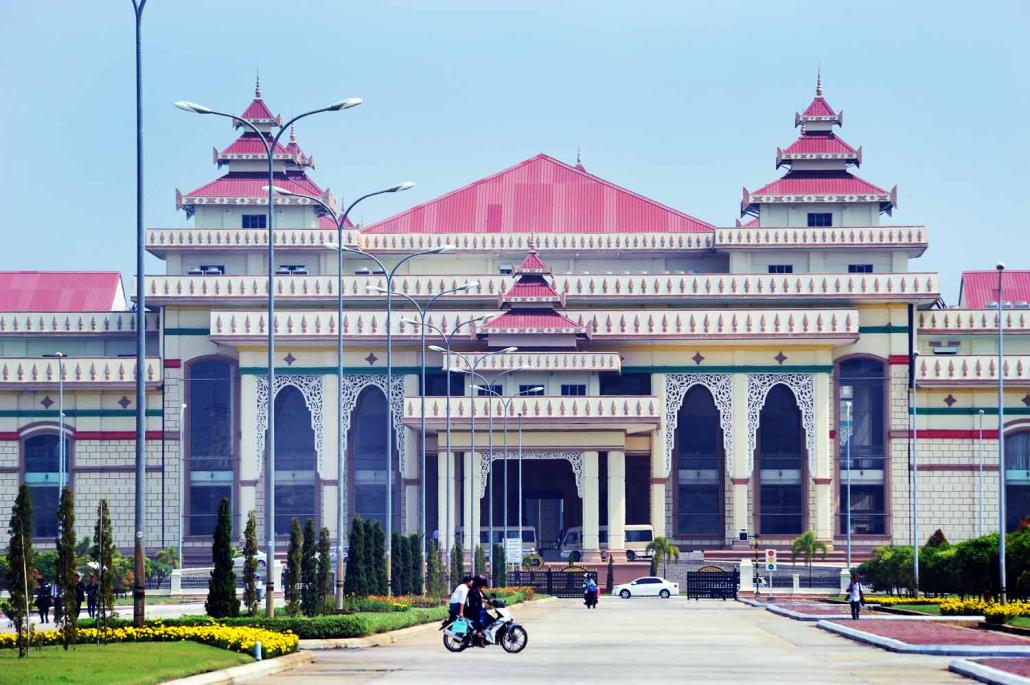
Steve Tickner / Frontier
A few months earlier, in March, ANP MP U Oo Hla Saw (Mrauk U) had tried unsuccessfully to submit a proposal in the Pyithu Hluttaw that would allow students to form unions. He said Speaker Win Myint stopped him from doing so on the grounds that the government had already taken action on the issue.
“I wonder why the proposals by ANP MPs are rejected. Is it bias?” Oo Hla Saw told reporters on November 23, adding that he also wondered if ANP MPs had no right to speak in the hluttaw.
A similar concern has been on the minds of some USDP lawmakers, including U Tin Aye, who represents Metman Township in the Wa Self-Administered Zone in Shan State. He tried unsuccessfully on August 2 to table an urgent proposal about making preparations to prevent “terrorist” incidents that could damage national security.
He was instructed two days later to change it to an ordinary proposal, but when it was re-submitted on August 11, Speaker Win Myint said it would be allowed only as a question. Tin Aye said he received a reply in September from the Ministry of Home Affairs in which said it was addressing the situation.
Tin Aye said his proposal had apparently fallen foul of parliamentary regulations stipulating that only matters involving current affairs could be submitted as “urgent”.
“Mine was not [considered] a current issue, so it was disallowed and the speaker said so,” he said.
“I submitted the urgent proposal because I believe pre-emptive action is better than waiting for something to happen, and then the violent attack occurred on the Border Guard police posts on October 9,” said the former military officer, who ran as an independent in the 2015 election but has since joined the USDP. “This is something I will never forget.”
The MPs whose proposals were blocked argue that the actions of the speakers have undermined the hluttaw. They point to section 10 of the Pyithu and Amyotha Hluttaw Laws, which state that an MP can ask questions and proposals in accord with constitution, with the permission of the speaker. However, the laws and by-laws are ambiguous – the clause can be read either as giving the speaker the power to decide on all questions and proposals, or giving MPs the right to ask any questions or make any proposal that is in line with the constitution.
But the MPs are also unhappy at the reason being given for preventing discussion of their proposals – that they are not necessary because the issues they raise are already being addressed by the government.
U Myat Ko, executive director of the Yangon School of Political Science, said it was normal for dominant parties to use their power in this way in a parliamentary system.
“For example, in the United States, when the Democratic Party holds a majority of seats in the Senate and Congress they turn a blind eye to bills submitted by the Republicans,” he said. “Now in Myanmar we have a somewhat similar thing happening. Some of the non-NLD parties are complaining that it’s ‘democratic bullying’, but the situation is not unusual.”
Frontier contacted U Shwe Mann for comment on how he handled similar issues as speaker of the previous parliament, in which the USDP held a large majority.
In a statement provided through a spokesman, he said: “Proposals that are in the interests of the people and the country should be allowed and given priority, but those that might hamper or obstruct the government’s work and the peace process should not be allowed. It’s not always easy to weigh up and calculate.”
Some NLD MPs are also disgruntled at the party’s strict controls on the hluttaw, which according to the constitution is supposed to act as a check on the activities of the government. In October, the NLD central executive committee, including Win Myint, ordered them not to raise issues likely to embarrass the government. They are suspicious of the motives of party leaders for issuing such an instruction.
At a news conference at the Pyithu Hluttaw on June 10, Win Myint said he was performing his duty as speaker according to hluttaw rules and regulations and insisted he was not defending the government.
Dr Hla Moe, (NLD, Aung Myay Thar Zan) secretary of the Pyithu Hluttaw Rights Committee, told Frontier that important proposals linked to current events could only be submitted for discussion subject to the speaker’s approval.
“It is done according to the experience and judgement of the speaker. There has never been a complaint and the committee has no comment,” Hla Moe said.
U Htin Kyaw Aye, research director at civil society group Open Myanmar Initiative, said hluttaw standing orders should be amended to ensure clarity and avoid controversy.
“The authority of the speaker should be more clearly defined,” Htin Kyaw Aye said. “The law should not give too much discretion to a single person.”
Top photo: A National League for Democracy lawmaker checks her phone before the start of a session earlier this year. (Steve Tickner / Frontier)


